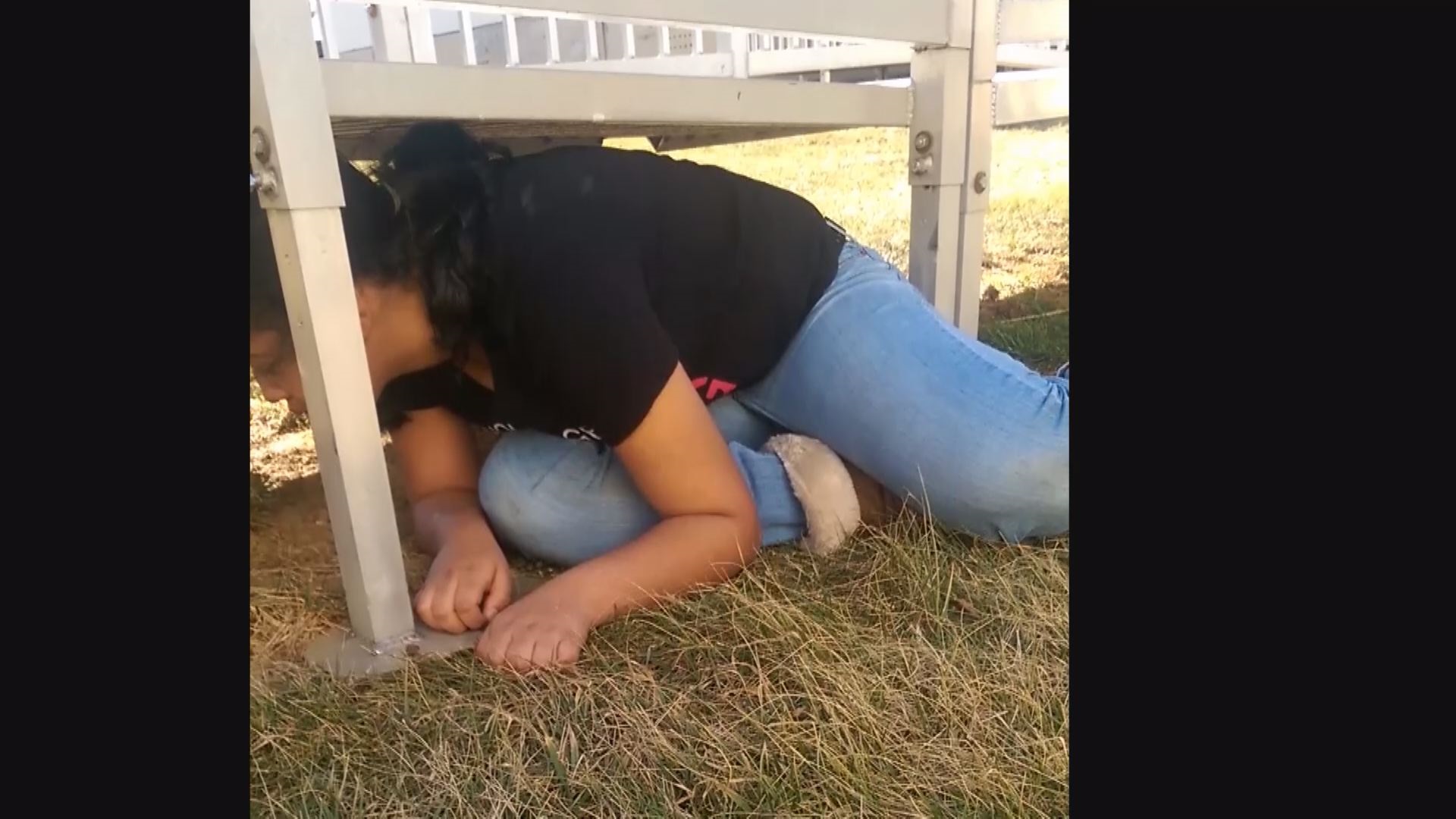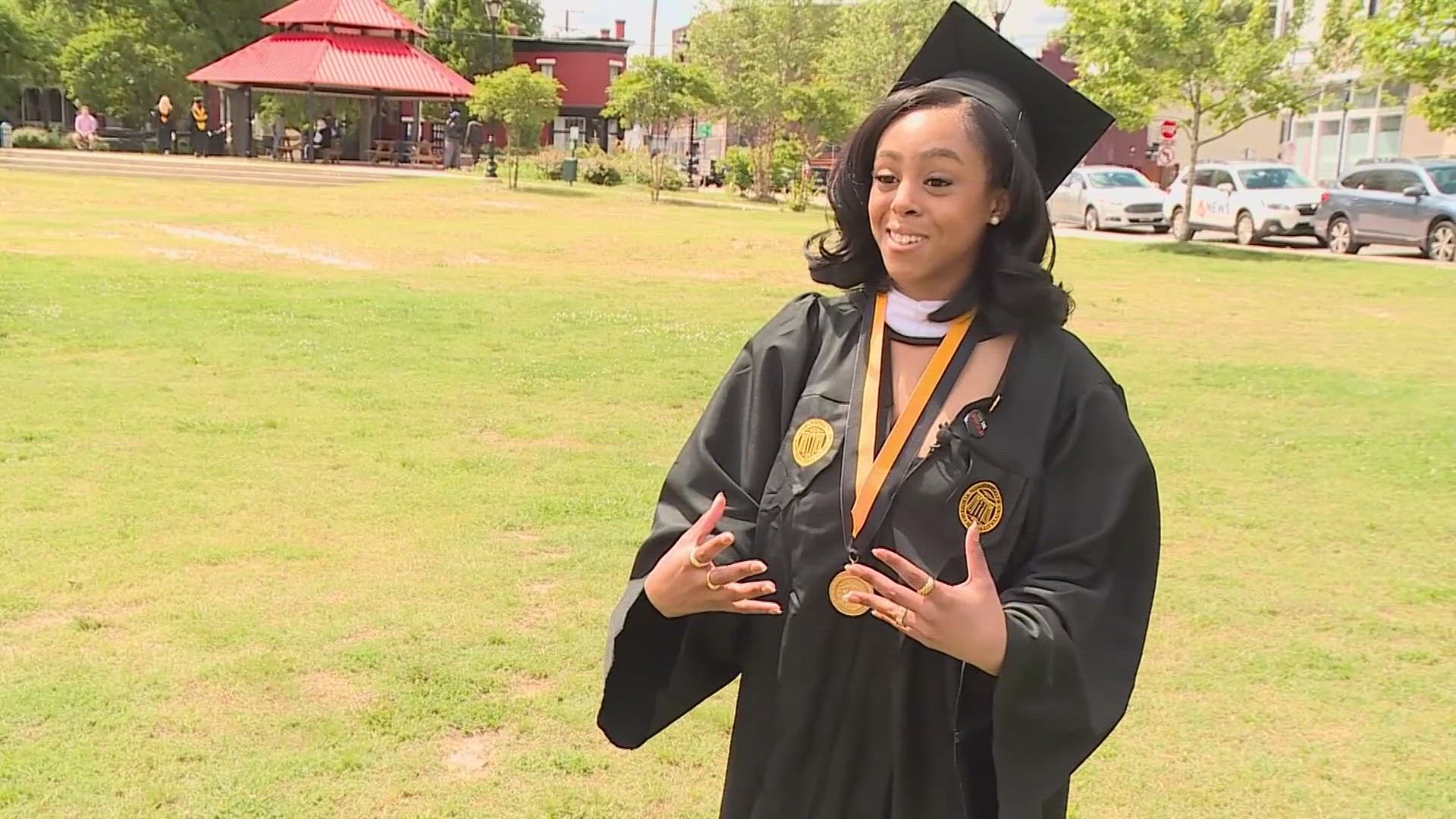When Glennette Strother hears about a mass shooting or another mass casualty, she's overwhelmed by fear.
"That could be her. It could be her," she said.
The Fairfax County mother was referring to her 15-year-old daughter, Breanna. The teenager battles a mental illness that leads to extremely violent episodes that come without warning.
It is a daily struggle to get Breanna the help she desperately needs. And so, this mother of five lives each day afraid of her oldest child and what she might do.
Breanna has physically attacked her parents, teachers and classmates. She has no memory of the incidents that have sent her to six psychiatric units in the last three years.
We asked whether she worried that she could become so violent, she could kill someone.
"Mmm, hmm," she replied, nodding emphatically.
What has been even more baffling to the family is that Breanna transforms into an aggressive dog when she's in the midst of one of these episodes. Doctors have been skeptical, most telling the distraught mother that illness "doesn't exist."
In 2017, Strother captured cell phone video outside Breanna's Fairfax County school during an outburst. In the video, the teen balled up her hands, growled, barked and only responded to officers who gave the same commands you would deliver to a dog. It took six officers to subdue her.
That was Breanna at her worst. We met her as she stepped off the school bus. We didn't know what to expect, but it wasn't the bubbly, energetic teen who emerged, eager to talk about her successful day at school.
Aside from her devastating mental illness, Breanna is a typical teenager. She plays on a soccer team and loves dogs.
That makes the family's journey that much more frustrating. Strother described the revolving door of psychiatric care.
"You go in. They put a Band-Aid on it and they send you home," she said. "You go in. They put another Band-Aid on it. They send you home. But they never give you true answers."
Compounding the issue is that psychiatric beds for adolescents are hard to come by. Breanna has waited as long as 28 hours. The shortest wait was seven hours. And that's only because her parents had a judge's order to detain her.
"Meanwhile you have a child in crisis who either is attempting suicide or saying they're going to kill themselves or who is so violent that she's handcuffed to a hospital bed," said Strother, who has kept meticulous records of each of her daughter's hospital stays. "I don't know how bad in the future this is going to get. We've seen it get really bad."
No one knows what triggers Breanna's transformation into an aggressive dog, or how to stop it.
The teen acknowledged, "It's like a devil that just came out of nowhere and wants to kill everyone."
In the course of reporting this story, we discovered that Stanford University has a clinic devoted to a rare mental illness known as PANS. It stands for Pediatric Acute-onset Neuropsychiatric Syndrome.
Some of its symptoms, including dog-like behavior, mirror what happened to Breanna.
"It's very scary cause at any moment I could snap and not even know that I did it," said Breanna.
The clinic has evaluated 300 children since it opened in 2012. Strother has reached out, but no response yet.
Here's a sobering statistic: the state of Virginia ranked 45th in the nation in terms of its high prevalence of mental illness among adolescents and its low availability of proper care. Maryland ranked 23rd. And DC fared the best in our area coming in 8th.
We asked licensed clinical social worker George Young who should be held accountable. He's on the front lines of the crisis in Northern Virginia.
We asked whether the mental health agencies, the insurance companies, legislators or the general public were to blame.
Young responded, "I would say yes."
He pointed to a fragmented system.
"If I have a crisis, I've got to call every hospital and say, do you have a bed? And answer the same 20 minutes worth of questions. And then, that doesn't fit, now I have to call this place. And then I have to call this place," Young said.
WUSA9 reached out to government agencies, mental health professionals, legislators, non-profits and insurance companies. The consensus: it all comes down to funding, and power. Young believes the solution begins with local, state and federal lawmakers.
"The politicians respond to our calls, but if we don't call, then they don't respond. And they'll respond to who does," he said. "Our society does not value mental health. Those individuals struggling with that. And that is provable by the amount of money that is put into addressing it. All of us as a community need to be held accountable."
Mental Health Resources
MARYLAND RESOURCES
*For immediate help, please call 911 or Maryland Suicide Hotline at 800-422-0009.
Mental Health Resource guide - Courtesy of the Governor’s Office
Maryland Resources for Children - Courtesy of the Mental Health Association of Maryland
Maryland Resources for Adults Without Insurance - Courtesy of the Maryland Association of Behavioral Health Authorities
DC RESOURCES
*For immediate help, please call 911 or 1-888-7WE-HELP
Local Resources - Courtesy of the DC Department of Behavioral Health
The Mental Health Association of the District of Columbia
1628 Sixteenth Street, NW
Washington, DC 20009
(202) 265-6363
Email: info@mhadc.org
Consumer Leadership Forum
1023 Fairmont Street, NW #101
Washington, DC 20001
(202) 609-7451
Email: info@clfofdc.org
National Alliance on Mental Illness Washington, DC
(NAMI DC)
422 8th St SE 2nd Floor
Washington, DC 20003
(202) 546-0646
Email: namidc@juno.com
Consumer Action Network (CAN)
1300 L Street, NW Suite 1000
Washington, DC 20005
(202) 842-0001
Fax: (202) 842-2685
Email: info@can-dc.org
Website: www.can-dc.org
Depression Bipolar Support Alliance (DBSA) of the National Capital Area
Contact 1: Info Line
(202) 689-1250
Contact 2: Alvin Martin
Phone: (301) 279-0831
Email: hello@dbsanca.org or alvin@dbsanca.org
Website: www.dbsanca.org
VIRGINIA RESOURCES
*For immediate help, call 911, the crisis number for your local community resource center, or (800) 273-TALK or (800) SUICIDE
Virginia Map of Community Resources - Courtesy of the Virginia Department of Behavioral Health and Development Services


